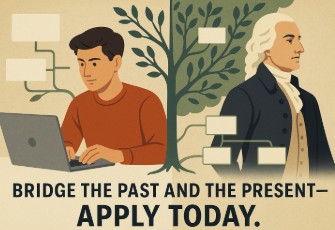
I know some of you are rolling your eyes at the title. Many of us have had poor interactions with societies. Some are just tea parties – they only want the members they currently have and enough new ones to do the grunt work, but those folks stand no chance of ever being fully accepted as an equal. Some societies are so picky that they require only direct evidence. Others will gladly take your money and fall apart, leaving you no connections to your interest area. I’ve even encountered downright rudeness, which is just unacceptable.
Still, you shouldn’t lump them all together, and even if you don’t SUBMIT the lineage society application, COMPLETING one will help you. Here’s why…
*By following the society’s process, you can spot holes in your research. You may think you have proven a relationship to a father and son, but do you have a document that states that? How solid is that document? Was it a county history written 300 years after the individuals died? Remember, the farther from an event, the more likely it is that memories will alter the events.
*Completing the application will also allow you to check for discrepancies in your research. I wish I had a buck for every wrongly engraved tombstone I’ve encountered. I value the death certificate higher than the tombstone but even those can contain errors. I don’t think I’ve ever completed an application that had simple, perfect direct evidence.
*You are reminded about the documents you previously found that you may have forgotten about. I’m notorious for forgetting second marriages if I’m related to the first. When I go back to an individual and am reviewing all the info, I gain much more insight into the individual’s life. I noticed that one of my husband’s third great grandmothers emigrated with her four siblings to the U.S., leaving behind her widowed father, who died two years after the migration. Can’t imagine how hard that must have been for the father – your wife is dead, and now all four of your children leave. Wow, just wow!
*Lineage societies want just the relationship and identify facts proven and typical, nothing else. This means you can readily check your accumulated documents to see if you have those records.
*Once you’ve completed the application, you have a nice set of documents that were sourced in a timeline for several generations of your family. This is the perfect time to write a narrative and include other items you have discovered. Got writer’s block? Turn to AI and make sure you ask whichever you are using to include footnotes or endnotes. Now you’ve started writing that family genealogy book you always said you would do.
*If you do choose to submit your work, you are having new eyes look at it, and that’s especially helpful. We all process information differently,y so having someone who isn’t emotionally involved is helpful to validate what you’ve acquired.
*Another plus for submitting is that your hard-earned research is now safely at an archive or repository outside of your home. You’re increasing the likelihood that your information will be available to future researchers. Who knows what the future might bring, and your information might be the only proof of an ancestor someday.
*You are memorializing folks that have been forgotten. This is especially true with woman who often just leave their first name, if that, in records. With an application for a pioneer society, I included photos of the church, worksites, and the home where a third great-grandmother once lived. I know that from church records, but I have no record of her birth/baptism or death/burial.
*If you are accepted, you might just find a new friend or colleague who shares an interest that you have for a particular region or time. I’ve met wonderful far removed relatives this way and value the connections we have because of a common ancestor.
*Last, you should give yourself a big pat on the back and be proud that all your hard work paid off. You made the discovery of your forefathers that you sought. They may not have been famous or even made choices that you would have, but you discovered information about people who were trying to make their way through this weird thing we call life so that someday, you could do the same.
Pretty neat!
And while ChatGPT created the graphic, it came up with a limerick to add:
To connect to your roots with some flair,
A form and some proof—show you care!
From laptop to scroll,
It’s a meaningful goal—
Your ancestors’ legacy laid bare.
